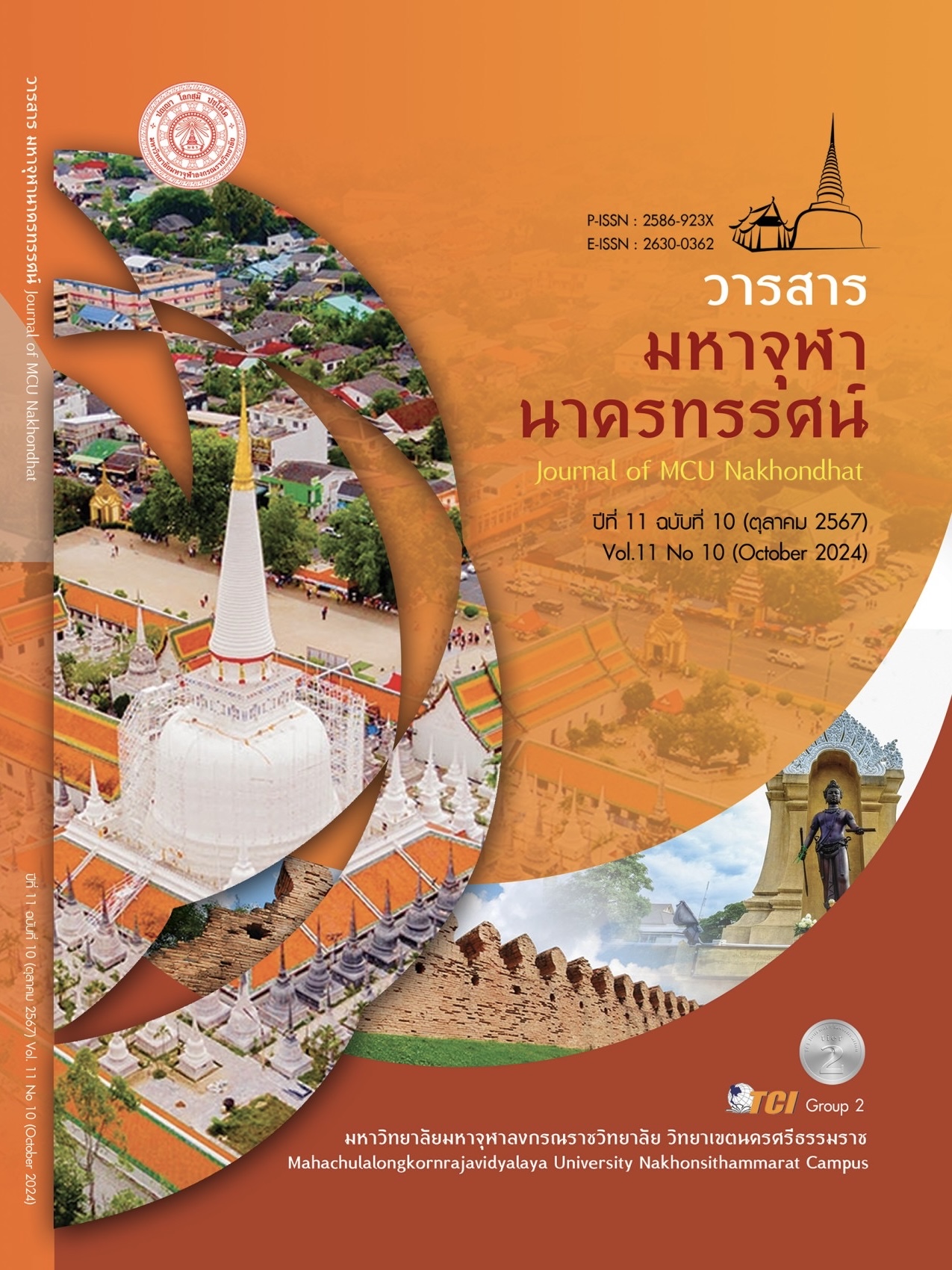PARTICIPATORY ADMINISTRATIONS OF EDUCATIONAL PARTNERSHIPS AFFECTING THE DEVELOPMENT OF ACADAMIC EXCELLENCE IN PRIVATE SCHOOLS UNDER CHONBURI PROVINCIAL EDUCATION OFFICE
Main Article Content
Abstract
This research aimed to: 1) Study participative management of educational stakeholders under the Chonburi Provincial Education Office, 2) Examine the development towards excellence of private educational institutions under the Chonburi Provincial Education Office, 3) Investigate the relationship between participative management of educational stakeholders and the development towards excellence of private educational institutions under the Chonburi Provincial Education Office, and 4) Create a predictive model for participative management of educational stakeholders that impacts the development towards excellence of private educational institutions under the Chonburi Provincial Education Office. This quantitative research utilized questionnaires with a sample group of 357 administrator and teacher under Chonburi provincial education office. The sample size was determined using Krejcie and Morgan's sample size table. Data analysis included means, standard deviations, Pearson's correlation coefficients, and simple regression analysis. The findings indicated that: 1) Education partnerships participatory management was rated highest ( = 4.55, S.D. = 0.47), 2) Development towards excellence of private schools was also rated highest (
= 4.58, S.D. = 0.4), 3) There was a significant positive correlation between participatory management and development towards excellence of private schools at the .01 level, and 4) Participatory management affecting the development towards excellence of private schools was established predictive equation for development towards excellence of private schools it was possible to create forecast equations with 69 %. The predictive equations were formulated as follows: Raw score prediction
= 1.086 + 0.769X and Standardized score prediction
= 0.83*Zx.
Article Details

This work is licensed under a Creative Commons Attribution-NonCommercial-NoDerivatives 4.0 International License.
References
แก้วภัทรา จิตรอักษร และคณะ. (2565). ความสัมพันธ์ระหว่างคุณลักษณะผู้นำกับการบริหารแบบมีส่วนร่วมของผู้บริหารสถานศึกษา สังกัดสำนักงานเขตพื้นที่การศึกษาประถมศึกษาราชบุรี เขต 1. วารสารสิรินธรปริทรรศน์, 23(1), 249-261.
ชิษณุพงศ์ ทองพวง และคณะ. (2565). รูปแบบความสัมพันธ์ระหว่างการบริหารผลงาน การบริหารงานคุณภาพ และองค์การแห่งความเป็นเลิศของมหาวิทยาลัยคริสเตียน. วารสารมหาวิทยาลัยคริสเตียน, 28(1), 128-140.
ชุติกาญจน์ หลวงแสน และคณะ. (2564). ปัจจัยที่ส่งผลต่อความเป็นเลิศในการบริหารงานวิชาการ ของโรงเรียนขนาดเล็ก จังหวัดอุตรดิตถ์. Journal of Roi Kaensarn Academi, 6(9), 23-34.
ปกรณ์ ประจันบาน. (2555). สถิติขั้นสูงสำหรับการวิจัยและประเมิน. (พิมพ์ครั้งที่ 4). พิษณุโลก: รัตนสุวรรณการพิมพ์.
พรพินิจ ไชยลังกา และคณะ. (2559). การบริหารสู่ความเป็นเลิศทางวิชาการของโรงเรียนเอกชนในจังหวัดเชียงราย. วารสารสังคมศาสตร์วิชาการ, 9(1), 160-176.
พระราชบัญญัติการศึกษาแห่งชาติ (ฉบับที่ 4). (2562). ราชกิจจานุเบกษา เล่ม 116 ตอนที่ 74 ก หน้า 4-16 (19 สิงหาคม 2562).
รัฐธรรมนูญแห่งราชอาณาจักรไทย พ.ศ. 2540. (2542). ราชกิจจานุเบกษา เล่ม 114 ตอนที่ 55 ก หน้า 1-99 (11 ตุลาคม 2542).
ศรรัก ผลาเมธากูล และฉลอง ชาตรูประชีวิน. (2565). ปัจจัยที่ส่งผลต่อการบริหารสู่ความเป็นเลิศของโรงเรียนมัธยมศึกษา สังกัดสำนักงานเขตพื้นที่การศึกษามัธยมศึกษาแพร่. Journal of Inclusive and Innovative Education, 6(2), 134-148.
สำนักงานคณะกรรมการส่งเสริมการศึกษาเอกชน. (2566). แผนพัฒนาการศึกษาเอกชน พ.ศ. 2566 - 2570. กรุงเทพมหานคร: ห้างหุ้นส่วนสามัญนิติบุคคลเจี้ยฮั้ว.
สำนักงานปลัดกระทรวงศึกษาธิการ. (2566). สถิติการศึกษาฉบับย่อ. เรียกใช้เมื่อ 28 สิงหาคม 2566 จาก https://shorturl.asia/Kb6Hj
หัทยาพร แสงดี และคณะ. (2565). การบริหารแบบมีส่วนร่วมของผู้บริหารสถานศึกษาที่ส่งผลต่อการดำเนินงานตามมาตรฐานการศึกษา ระดับการศึกษาขั้นพื้นฐาน สังกัดสำนักงานเขตพื้นที่การศึกษาประถมศึกษาชลบุรี เขต 3. วารสารบัณฑิตศึกษา มหาวิทยาลัยราชภัฏสกลนคร, 19(87), 120-135.
อรสา ทรงศรี และคณะ. (2557). รูปแบบการบริหารกิจการนักเรียนแบบมีส่วนร่วมของโรงเรียนมัธยมศึกษา สังกัดสำนักงานเขตพื้นที่การศึกษามัธยมศึกษา. วารสารจันทรเกษสาร, 20(38), 143-151.
Cronbach, L. J. (1990). Essentials of psychological testing. (5th ed.). New York: Harper Collins Publishers.
Krejcie, R. V. & Morgan, D. W. (1970). Determining Sample Size for Research Activities. Educational and Psychological Measurement, 30(3), 607-610.
Likert, R. (1967). The Method of Constructing and Attitude Scale, in Attitude Theory and Measurement. New York: Wiley & Son.


